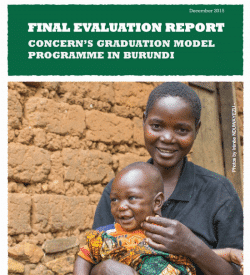
Policy highlights:
- This paper presents an impact study of Concern Worldwide’s ‘Graduation Model Programme’, which was implemented in two of Burundi’s poorest provinces.
- Beneficiary households received monthly cash transfers, capital for income-generating activities, access to savings, a mobile phone, and skills training and coaching, often in the form of behaviour change communication (BCC) disseminating messages about good practices around hygiene, nutrition, gender equity, and so on.
- The programme yielded substantial impacts in three areas: 1) material (e.g. improved housing and sanitation facilities, and improved domestic and farming assets and livestock); 2) behavioural (e.g. increased school enrolment and use of formal healthcare, more use of contraception and more knowledge of HIV/AIDS); and 3) social (e.g. female empowerment in terms of intra-household decision making and increased participation of women in community institutions).
- Research results can be translated into several recommendations for policymakers: 1) impacts largely levelled off after finalization of the project, hence, continued coaching and support is needed to ensure sustainable results; 2) the presence of case managers to support individuals, resolve intra-household conflict and provide mentoring is crucial for long-term success; 3) the complex and integrated interventions in graduation programmes require well-trained, engaged and, thus, adequately-remunerated staff.






